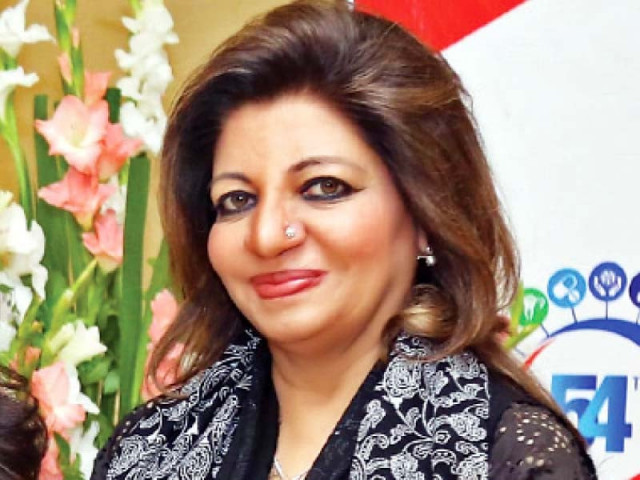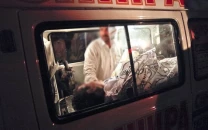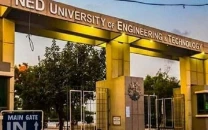JPMC’s ‘iron lady’ retires
Dr Seemin Jamali passes the mantle after over three decades of service

A day ahead of her retirement Jinnah Postgraduate Medical Centre (JPMC) Executive Director Dr Seemin Jamali is content with her 33 years of public service.
As the longest-serving Grade-21 executive director of the city's largest tertiary care hospital, Dr Jamali's name has become synonymous with JPMC's emergency ward, where she served for nearly three decades.
She retired on Thursday and her absence will be felt acutely by the hospital and the city at large.
Appointed as the executive director on November 18, 2016, Dr Jamali has tended to over 200 bomb blast victims, countless gunshot victims, casualties from accidents, building collapses, plane crashes as well as the thousands of people who routinely arrive at the government hospital's emergency ward.
The JPMC emergency ward treats up to 1,500 patients on average daily and almost all are tended to free of charge. As the facility receives around 75 per cent of the city's emergency cases, the number of patients rises exponentially in crisis situations. Besides, patients from Sindh and Balochistan's remote areas, where citizens are deprived of emergency health facilities, also frequent JPMC.
It was not easy being a woman and running the largest government hospital in a sprawling urban centre. She faced threats to her life, attacks and targeted campaigns aiming to malign her.
It hasn't been easy, she tells The Express Tribune, reminiscing over her years of service.
"Nobody can say I have ever refused service to anyone coming to this hospital," said Dr Jamali.
"I worked without prejudice."
Tending to all kinds of casualties and dealing with traumatised patients is not for the faint-hearted, even if they are doctors but Dr Jamali never faltered.
Among her patients and the medical community she is known as the 'iron lady', 'bullet lady' and also the 'bomb-proof lady'.
Sharing an anecdote, the senior doctor said that the first time she held a hand grenade was after she retrieved it from the pocket of an injured man in the emergency room. "I was unaware of what it was and carried it [out] without knowing," she recalled smiling.
Read Administrative troubles plague JPMC
"I also witnessed a blast in the hospital, apart from several other terrible attacks and incidents on the premises."
In November 2020 she was diagnosed with colon cancer and she continued working through her treatment before managing to successfully defeat it.
Dr Jamali graduated from Nawabshah Medical College in 1986 and completed her house job from Dr Ruth Pfau Civil Hospital, which was then known as Civil Hospital Karachi. Besides a Bachelor of Medicine and Bachelor of Surgery (MBBS) degree, she also completed her Masters in Primary Healthcare Management (MPHM) from Thailand and a postdoctoral fellowship in Emergency Care from the United States of America.
Her job at the JPMC's emergency ward was the first of her career.
"I do not have any private hospital. I served day and night [at the public facility] and am satisfied with my career as a doctor and the head of this hospital", Dr Jamali remarked.
When Dr Jamali joined the JPMC, the government hospital had no boundary wall. It had remained a challenge for all former heads of the hospital to have a wall constructed to separate the city's largest health facility from the city itself. A dhobi-ghat was set up almost inside the hospital premises while fumes emitting from parked cars and vehicles, noise pollution from street vendors and leering bystanders were constant.
Through her untiring efforts she managed to not only have the wall constructed but also managed to transform the facility such that it could match the services offered at more costly private sector hospitals.
Despite being the daughter of a highly respected civil servant, Ghulamullah Din Muhammad Memon popularly known as GD Memon - who is remembered to this day for his staunch stance for Sindh's water share when the Water Appropriation Award of 1991 was being debated - Dr Jamali managed to carve out a name for herself.
Through sheer will and dedication, she gained recognition among the medical community and citizens at large.
On her last working day (Tuesday) Dr Jamali could safely say that has had cordial relationships with all political and social organisations. It isn't possible to serve a city like Karachi without the support of various stakeholders and political actors.
As she retires, Dr Jamali, who was recognised as a 'global hero' by the World Health Organisation for her services during the coronavirus pandemic and has received numerous awards including the Tamgha-e-Imtiaz in 2019, has no plans for the future.
For now, she is content with the memories - both good and bad - she has collected during her years of service at JPMC.
Published in The Express Tribune, August 19th, 2021.


















COMMENTS
Comments are moderated and generally will be posted if they are on-topic and not abusive.
For more information, please see our Comments FAQ